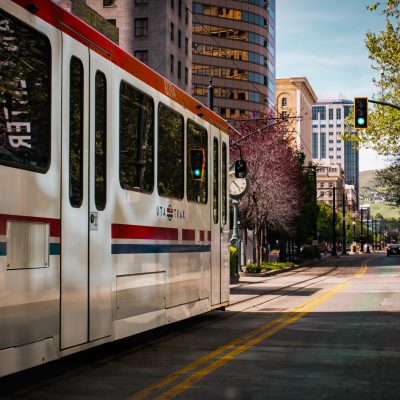by Joanne Moyer
I have lived in a car free household for nearly all my adult life. At first, this was primarily an economic choice, but over time, it became a sustainable and simple living commitment that I have maintained for over 20 years.
Counting the Ripple Effects
Living without a car contributes to sustainability and simple living in multiple ways. Obviously, a car is a large material investment and driving regularly uses a lot of energy. But there are also various ripple effects. I manage my transportation by cycling, walking, and taking public transit, with occasional rides from friends or in a taxi. Because so much of my transportation takes place outdoors, I am more connected to my immediate environment than I would be if I went from house to attached garage to office. I need to know the weather and other environmental conditions so that I can dress appropriately. Furthermore, when walking and cycling, I am moving more slowly. I have time to see, hear, and smell the landscape through which I am traveling. In Edmonton, where I currently live, there are beautiful river valley and ravine trails that I can incorporate into my commute. They connect me with the natural environment within the city. As a bonus, my commute also provides me with free exercise every day, as part of my daily routine.
Living without a car also limits what I purchase. Getting to stores can be a hassle, especially as more shopping areas are concentrated in box store jungles at the edges of towns. Unless I really need something, shopping is often too much of a bother to bother. Furthermore, anything I purchase needs to be carried home on my back, my bicycle or in my little shopping cart. This all makes shopping a much more intentional affair. Large purchases require planning and requesting the help of a friend with a car. I have also carried a surprising range of items on my bicycle, from a small ironing board to a shoe rack to a garden hoe. I’m working up to a goat!
A slower pace of life
Finally, living without a car inevitably forces me to slow down. We live in a fast paced world where we are always supposed to be doing and being and getting more. The quick and convenient travel provided by a car makes it possible to participate in this fast pace. Other modes of transportation take longer, and this means that I can’t do quite as many things and the pace of my life is slower.
There are also many challenges to living without a car. Few cities in North America are geared toward car free living, and both infrastructure and services are lacking. Transit systems, bicycle routes, secure bicycle storage and even sidewalks often leave much to be desired. Car culture is also so prominent that many motorists don’t understand how to share the road well with cyclists or even pedestrians. It can also be a challenge to fit my lifestyle into that of my car-driving family or friends, and I miss opportunities to get out of the city and enjoy the wilderness.
Getting started
Despite these challenges, some of which have increased since I moved to a new city with a poorer transit system, living without a car is for me both a rewarding lifestyle choice and a powerful witness to committed sustainability. Though living entirely without a car may not be an option for everyone, there are many ways to incorporate sustainability into your travel:
- Avoid taking the car for short trips. See if you can get to your main daily activities (e.g., work, school, etc.) by walking, cycling, transit, or carpooling.
- Get a little shopping cart to help transport items for smaller shopping excursions.
- Invest in necessary gear – good walking shoes, jackets, a nice bicycle (A “nice” bicycle does not need to be the highest end bike available, but a bike at the lower price range of “good” will provide a smoother and more enjoyable ride than a cheap bike).
- If you are moving, consider transportation options when you choose your new location. Is it near transit that goes places you want to go? Is it near amenities like grocery stores or schools?
And most importantly, approach getting places as an adventure.
Joanne Moyer is a member of the Creation Care Council of Mennonite Creation Care Network. She teaches at The Kings University in Edmonton, Alberta.
